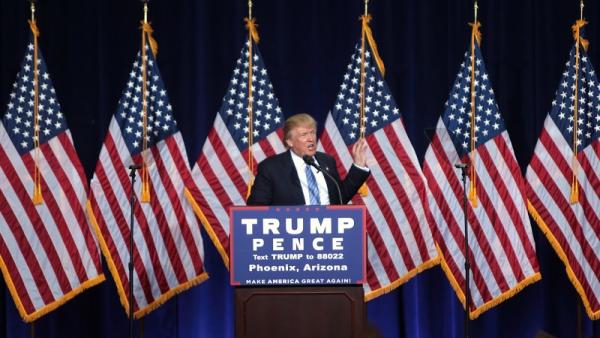Wild cards and the Trump card
Gage Skidmore / Flickr

James Laurenceson, Deputy Director, Australia-China Relations Institute, University of Technology Sydney |
This article appeared in the March 2017 edition of U:Mag.
Before even stepping foot in office, the United States’ President Donald Trump began talking tough on trade with China. But what does that mean for Australia? Deputy Director of the Australia-China Relations Institute James Laurenceson explains how a potential showdown between our country’s most important defence ally and our biggest trade partner could affect the Australian economy and our commitment to international law.
Last year, the Australian Government took a principled stance on a matter of international law. An arbitration panel, set up in accordance with the United Nations Convention on the Law of the Sea (UNCLOS), had issued a ruling in a case brought by the Philippines, which had challenged the actions of China in the South China Sea. The decision firmly favoured the Philippines.
China is Australia’s biggest customer for both goods and services, totalling $85.9 billion in 2015-16. China is also an increasingly important investment partner. In 2014-15, the Foreign Investment Review Board approved Chinese investment worth $46.6 billion. The next largest was the U.S. with only $25 billion.
Yet, this crucial economic relationship did not stop Australia’s Minister for Foreign Affairs Julie Bishop from issuing a statement that called for both the Philippines and China to respect the tribunal’s “final and binding” decision. Australia’s response was stronger than that of any other country in the region, including those with territorial claims in the South China Sea, such as Vietnam and Malaysia.
China’s foreign ministry reacted swiftly, criticising Bishop for her 'wrong remarks'.
But, for a sparsely populated country that is highly dependent upon trade, an adherence to international law is core to Australia’s national interest. The alternative is a world in which ‘might is right’. And that is a world in which Australia is unlikely to fare well.
Following the 20 January inauguration of Donald Trump, Australia looks set to get another opportunity to demonstrate its commitment to international law.
The US, led by the new Trump administration, appears headed towards starting a trade war with China. During the presidential election campaign, Trump floated the idea of a 45 per cent tariff on Chinese imports in a bid to reduce the US trade deficit with China.
Since his unexpected victory, President Trump has stacked his cabinet and advisory team with extreme China hawks. His chief trade advisor Peter Navarro is a fringe academic whose publications include titles like Death by China and The Coming China Wars.
Though Trump’s first week in office was punctuated by talk of a 20 per cent tariff on imports from Mexico, all indications are that China will again be in the direct line of fire soon enough. And any imposition of a blanket tariff on Chinese imports would put the US in plain breach of its international obligations.
The US is a member of the World Trade Organization (WTO), an institution whose purpose it is to regulate world trade. WTO members are allowed to impose protective tariffs but only on specific goods and in specific circumstances, such as if one country tries to dump goods on another at below production cost. WTO members also have access to a dispute settlement mechanism in which complaints can be brought, defended and adjudicated upon by an independent panel.
As with the South China Sea arbitration case, Australia would again face a difficult choice with the same core Australian national interest of a rules-based international order at risk. The US is a critical security alliance partner, and also has the largest stock of foreign investment here.
However, the costs to Australia of the US launching a trade war with China are far more obvious than those posed by China’s island-building in the South China Sea, and condemned by UNCLOS. Indeed, US tariffs that hurt demand for China’s manufactured goods are far from a distant development.
Research by the Reserve Bank of Australia shows that China’s manufacturing sector has been a major consumer of steel, and in turn, Australian iron ore. And if Trump’s tariffs were to derail China’s economic transition, which previously had been expected to deliver 850 million more Chinese into middle class status by 2030, it would damage the brightest spot on Australia’s economic horizon for everything from beef to tourism.
In 2015-16, China bought $8.1 billion worth of Australia’s ‘clean and green’ agricultural output (the US was next with just $4.5 billion). In the same year, China, was our biggest market for services including tourism and education, valued at $10.7 billion (a jump of 21.3 per cent on 2014-15).
China is also likely to respond to the US provocation, potentially setting off a cascade of retaliatory actions that take us into the realm of what can only be described as a ‘known unknown’. Faced with these challenges, how might Australia position itself?
In the short-term, our diplomats in Washington should take every opportunity to remind the Trump administration that the balance of trade is a poor measure of the benefits from trade. They might like to mention that Australia’s largest trade deficit by far is with the US, but no-one in Canberra is seriously talking about imposing a tariff on US imports.
It is also important that Australia demonstrates its own ongoing dedication to free and rules-based trade by negotiating new bilateral and multilateral agreements. The Regional Comprehensive Economic Partnership, involving the 10 Association of Southeast Asian Nations (Brunei, Cambodia, Indonesia, Laos, Malaysia, Myanmar, Philippines, Singapore, Thailand and Vietnam), as well as China, Japan, South Korea, India and New Zealand, would be an ideal place to start.
If worse came to worst, and the Trump administration did take action outside the WTO, Australia would have no option but to make its position crystal clear. That means issuing an official statement expressing regret, opposing such actions and defending the current rules-based system.
Author
Professor James Laurenceson is Deputy Director of the Australia-China Relations Institute (ACRI) at the University of Technology Sydney.

